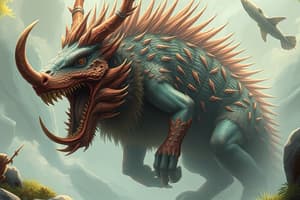Podcast
Questions and Answers
Name the eight levels of classification.
Name the eight levels of classification.
Domain, Kingdom, Phylum, Class, Order, Family, Genus, Species
Which of the following are characteristics of the Animalia Kingdom? (Select all that apply)
Which of the following are characteristics of the Animalia Kingdom? (Select all that apply)
- Autotroph
- Heterotrophs (correct)
- Multi-cellular (correct)
- Eukaryote (correct)
Which of the following are characteristics of the Plantae Kingdom? (Select all that apply)
Which of the following are characteristics of the Plantae Kingdom? (Select all that apply)
- Autotroph (photosynthesis) (correct)
- Eukaryote (correct)
- Multi-cellular (correct)
- Heterotroph
Which of the following are characteristics of the Kingdom Protista? (Select all that apply)
Which of the following are characteristics of the Kingdom Protista? (Select all that apply)
Which of the following are characteristics of the Domain Archaea and Domain Bacteria? (Select all that apply)
Which of the following are characteristics of the Domain Archaea and Domain Bacteria? (Select all that apply)
Prokaryotes have no ____________.
Prokaryotes have no ____________.
What is classification?
What is classification?
Why is classification important?
Why is classification important?
What is the broadest (most general) level of classification?
What is the broadest (most general) level of classification?
What is a eukaryotic cell?
What is a eukaryotic cell?
Which Kingdoms have organisms with eukaryotic cells? (Select all that apply)
Which Kingdoms have organisms with eukaryotic cells? (Select all that apply)
Organisms that have more levels of classification in common, are more closely ______________.
Organisms that have more levels of classification in common, are more closely ______________.
What are decomposers?
What are decomposers?
Which of the following are characteristics of Fungi? (Select all that apply)
Which of the following are characteristics of Fungi? (Select all that apply)
What are heterotrophs?
What are heterotrophs?
What's the hint about King Philip?
What's the hint about King Philip?
What is chlorophyll?
What is chlorophyll?
What is the first word in an organism's scientific name?
What is the first word in an organism's scientific name?
What is the second word in an organism's scientific name?
What is the second word in an organism's scientific name?
Flashcards are hidden until you start studying
Study Notes
Classification Levels
- Eight levels of classification: Domain, Kingdom, Phylum, Class, Order, Family, Genus, Species.
Animalia Kingdom Characteristics
- Organisms are multi-cellular, heterotrophic, and eukaryotic.
Plantae Kingdom Characteristics
- Organisms are multi-cellular, autotrophic (perform photosynthesis), possess cell walls and chloroplasts, and are eukaryotic.
Protista Kingdom Characteristics
- Organisms can be multi-cellular or unicellular, eukaryotic, and display movement via flagella, cilia, or pseudopods.
Archaea and Bacteria Domains
- Organisms are unicellular and prokaryotic, lacking a nucleus.
Prokaryotic Cell Features
- Prokaryotes do not have a nucleus.
Classification Definition
- The action of grouping organisms or items based on shared characteristics.
Importance of Classification
- Simplifies the study of organisms, making research and learning easier.
Broadest Level of Classification
- The most general classification level is the Domain.
Eukaryotic Cells
- Defined as cells that contain a nucleus.
Eukaryotic Kingdoms
- Organisms with eukaryotic cells belong to four kingdoms: Animalia, Plantae, Fungi, and Protista.
Relatedness in Classification
- Organisms sharing more classification levels are more closely related.
Decomposers Definition
- Fungi serve as decomposers by digesting organic matter and recycling nutrients back into the soil.
Fungi Characteristics
- Organisms are multi-cellular, heterotrophic, and eukaryotic.
Heterotrophs Definition
- Organisms that cannot synthesize their own food.
Mnemonic for Classification
- "Did King Philip Come Over For Green Soup?" serves as a mnemonic for remembering classification levels.
Chlorophyll Role
- A pigment responsible for giving leaves their green coloration.
Scientific Naming Convention
- The first word in a scientific name indicates the Genus, while the second word specifies the Species.
Studying That Suits You
Use AI to generate personalized quizzes and flashcards to suit your learning preferences.




